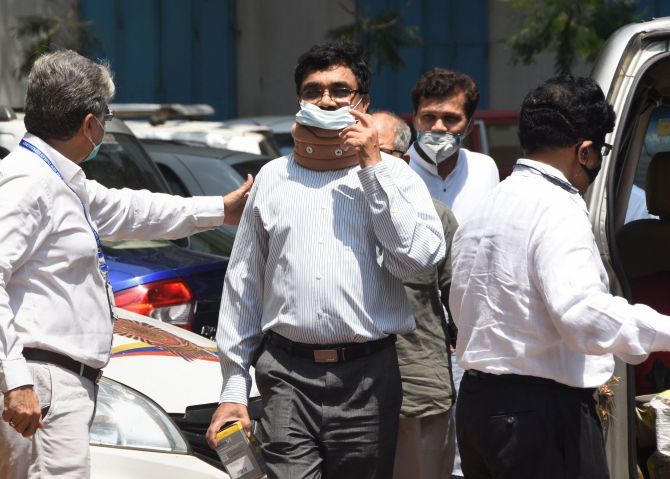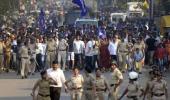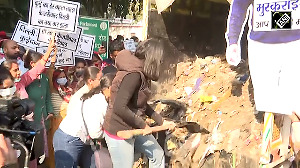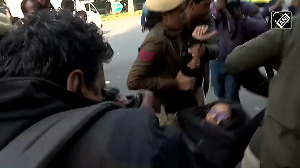A special court in Mumbai on Tuesday remanded Dalit scholar and activist Anand Teltumbde in the custody of the National Investigation Agency till April 18 in Elgar Parishad-Maoist link case.

Teltumbde was arrested by the National Investigation Agency earlier in the day after he surrendered before it following the Supreme Court's directives.
He is the grandson-in-law of Dalit icon Dr B R Ambedkar, whose 129th birth anniversary is being observed on Tuesday.
Civil rights activist Gautam Navlakha, a co-accused in the case, also surrendered before the NIA in Delhi. His anticipatory bail plea was also rejected by the apex court.
Navlakha was to be produced before special NIA court in Mumbai through video conference, but the court said since he had surrendered in Delhi, he will have to be produced before a court there first.
An NIA lawyer said he would be produced before a court in the national capital for seeking his transit remand after which he will be brought to Mumbai.
Teltumbde reached the NIA office here in the afternoon with his wife Rama Teltumbde and brother-in-law and Dalit leader Prakash Ambedkar and surrendered.
In the court, the NIA sought ten-day custody of Teltumbde, but judge A T Wankhede granted it remand till only April 18.
The Supreme Court on March 17 this year had rejected pre-arrest bail pleas of Anand Teltumbde and Navlakha, and directed them to surrender before the investigating agency.
In a statement, Navlakha said the 'draconian provisions of the Unlawful Activities (Prevention) Act are not accompanied by stricter procedures regarding evidence, especially electronic, considering the stringent punishment provided for under the Act; the procedures, which otherwise provide tighter rules regarding evidence, are instead made elastic'.
'Under this double whammy, jail becomes the norm and bail an exception. In this Kafkaesque domain, process itself becomes punishment,' he said.
Navlakha had been asked to surrender by the Supreme Court.
Activist and journalist with Mumbai-based Economic and Political Weekly journal for years, Navlakha was one of the five activists arrested in the Bhima Koregaon case but was granted protection from arrest by the Supreme Court and the Bombay high court.
'As I prepare to leave to surrender before the NIA Headquarters in Delhi, I am glad that Justices Arun Mishra and Indira Banerjee gave me another week of freedom when they passed the order on April 8. A week of freedom means a lot in my condition, even in the age of lockdown,' he said.
Navlakha said their order resolved the predicament he encountered in complying with the March 16 order of the apex court, which obliged him to surrender by April 6 before the NIA, Mumbai.
'The lockdown that followed prevented me from travelling. Also, there was no direction from the NIA (Mumbai) regarding what I should do under the circumstances. I know now that I have to surrender myself to the NIA Headquarters in Delhi,' he said.
Navlakha said the prime minister has likened the challenge posed by the COVID-19 pandemic to a state of 'national emergency'.
'Meanwhile, the apex court recently intervened in the matter of jail conditions, and issued guidelines to authorities regarding overcrowding of jail inmates and the threat posed to prisoners and detenues, jail staff and other personnel assigned jail duties,' he said.
Navlakha said this concern remains although no case of COVID-19 has been reported in any jail so far.
'However, I am affected by the fear that my near and dear ones harbour about my captivity amidst COVID-19. I cannot help but feel disappointed that the terse order of the Supreme Court on April 8 had no reference to the COVID-19 pandemic, which has overtaken the world, including all of us in India,' he said.
He said he can now begin to face the actual legal process, which accompanies cases where provisions of the Unlawful Activities (Prevention) Act are invoked.
He said such Acts turn the normal jurisprudence upside down and added no longer is it the axiom that 'a person is innocent unless proven guilty'.
Teltumbde, Navlakha and nine other civil liberties activists have been booked under the stringent provisions of Unlawful Activities Prevention Act (UAPA) for having alleged Maoist links and conspiring to overthrow the government.
The activists were booked initially by Pune Police following violence that erupted at Koregaon-Bhima in the district.
According to police, the activists made inflammatory speeches and provocative statements at the Elgar Parishad meet held in Pune on December 31, 2017, which triggered violence the next day during 200th commemoration of the battle of Bhima Koregaon.
The police also said these activists were active members of banned Maoist groups. The case was later transferred to NIA.










 © 2025
© 2025